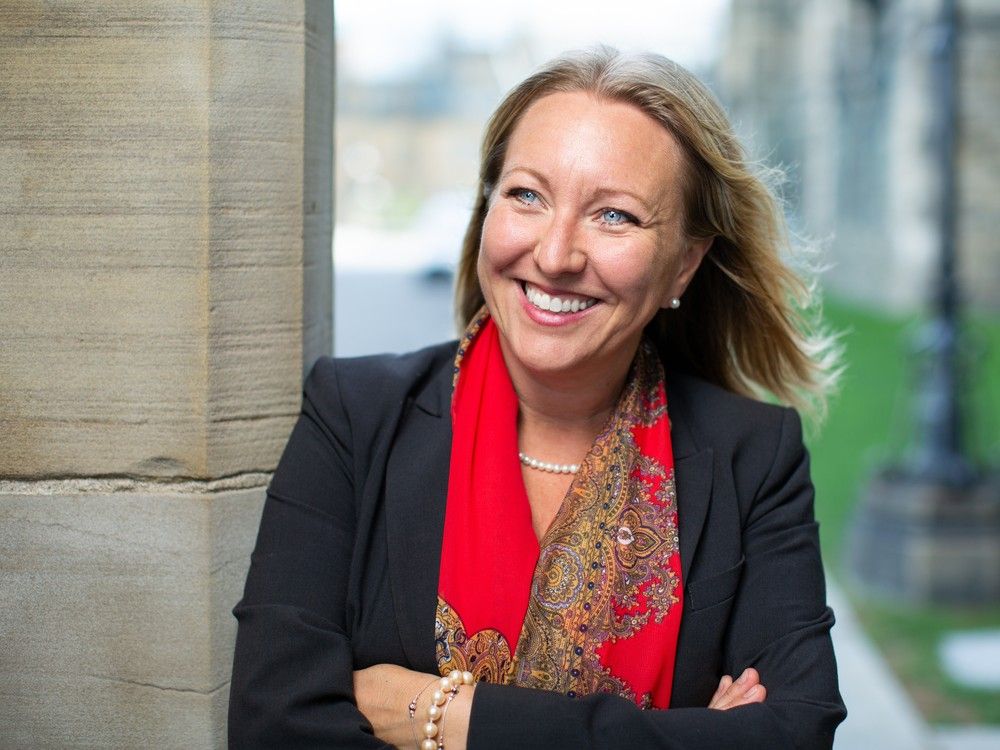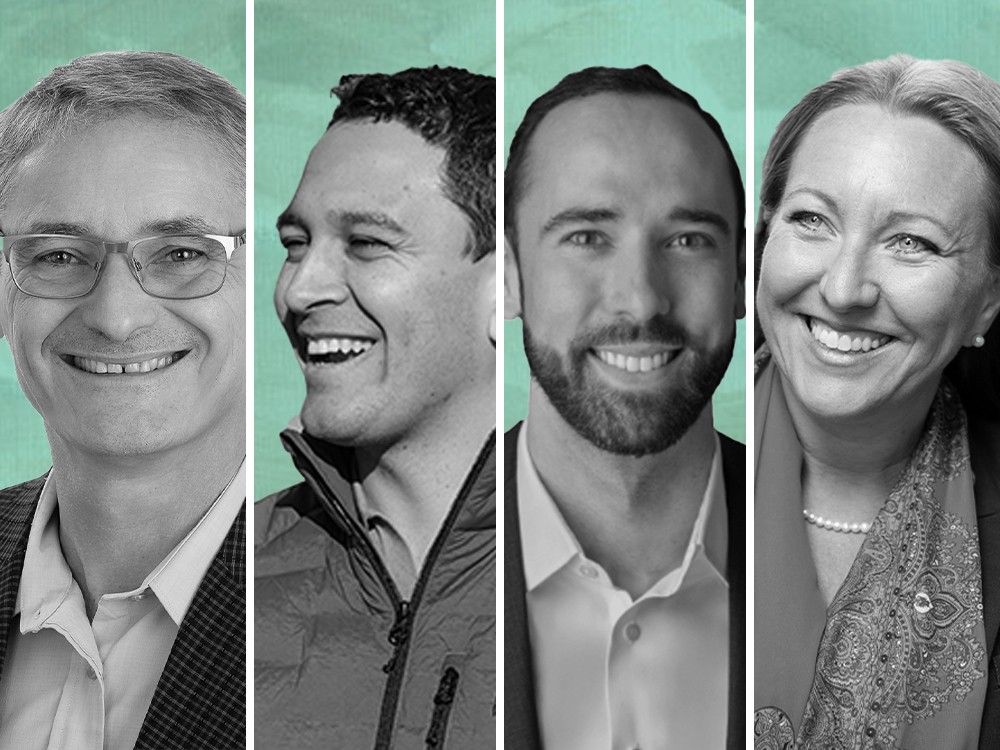- Mona Fortier of the Liberal Party
- Tristan Oliff of the New Democratic Party
- Christian Proulx of the Green Party
Dean Wythe of the Conservative Party declined an interview.
All interviews have been edited and condensed for clarity.

Mona Fortier is the Liberal candidate for Ottawa—Vanier—Gloucester.
Photo by Alex Tétreault
Mona Fortier, Liberal Party candidate
How do you plan to improve Canada’s economic competitiveness?
For me, economic prosperity for our country, and especially in our National Capital Region, is number one, especially right now with the challenges that we’re dealing with (U.S. President Donald) Trump. We need to be unified and one strong country.
I think this is an opportunity to bring down interprovincial barriers to give us a better chance to work together as a country, but also to diversify and fight the Donald Trump movement that is happening right now.
What is one locally-focused campaign pledge that you would implement as MP?
This is a great question. One thing I’ve been working on is housing.
Housing has an incident of helping different families or even people living with homelessness have a chance to start over, or a chance to live under a safe and secure roof, and have all of the chances to be able to participate actively as either a worker or volunteer.
I think that housing is an important issue that we need to deal with right now, especially in the Ottawa—Vanier—Gloucester riding. We’ve done a lot, but there’s still so much to do, and I think that the reaching home program needs to be continued and strengthened.
I believe that we have announced a plan that will help also young generations be able to buy their first home, and even other families that are buying their first home. For example, the GST being lifted for a unit that is under or at $1 million.
So, housing is a big one that also gives the way to making sure that families and people are able to work in this environment that we have and contribute to the economy.
What are your thoughts on the current size of the federal public service?
In the National Capital Region, we know that public service is the economic driver and number one employer, therefore we need to have a healthy public service, delivering the most important programs and services to Canadians.
I have been at many doors, and of course, many public servants are concerned about what will happen in the next chapter following this election, and I strongly believe that we need a strong public service here in the National Capital Region, because it also has an effect on the rest of our economy in the region.
Those jobs are so important for the economic prosperity of our National Capital Region. I really think that we need to continue to have a strong public service.
How do you propose helping fix the housing crisis in Ottawa?
Well, there are different situations where we need more affordable housing. We also need more opportunities for people living in a homeless situation to be able to have access to a housing-first approach, so a unit.
For example, the veterans’ house that we have in Wateridge, which is an excellent approach to help veterans that are unfortunately living in a homelessness situation be able to have access to a unit and services.
So we need those projects. And then we need to make sure we increase the supply.
Here in the National Capital Region, there’s a great demand for families to be able to either buy their first home or be able to have access to a safe and secure home and those programs that we’re bringing forward will help make sure we have an increased supply in the Ottawa—Vanier—Gloucester riding, but also in the National Capital Region.
What is your favourite season in Ottawa? Why?
I would say the summer. We have such great venues in our National Capital Region, from the Rideau Canal to even the Rideau River.
I love kayaking on the Rideau River. And also, it’s just great because people are outside and enjoying all the parks and the different amenities in the National Capital Region, but especially in Ottawa—Vanier—Gloucester.
My second favourite is the winter because we found a way through different means. You know, if it’s Winterlude or other activities like the
Festival des sucres
at the sugar shack at the Museopark. Winter can be a great opportunity to be outdoors, even cross-country skiing. I know that the Rideau Winter Trail is a big one, and a lot of volunteers are contributing. So I would say, of course, summer for me would be the first one. But then, if I could get the second best, winter here is also a great season.

Tristan Oliff, NDP candidate
How do you plan to improve Canada’s economic competitiveness?
Canada and Canadians are strongest when we’re taking care of each other, and right now, the conversations that I share, especially with neighbours and folks here in Ottawa—Vanier—Gloucester paint a picture where significant amount of people are being left behind and struggling to get by, even though they’re working harder than ever.
And so by addressing that and making sure that folks have enough to get by, we ensure that they can thrive, and that helps to circulate our local economy, improve folks’ agency and mobility and generally keeps us strong as a country.
What is one locally-focused campaign pledge that you would implement as an MP?
I would like to be a champion for guaranteed livable basic income. We know that there is a floor that is necessary for all Canadians to live with dignity, and right now, a growing number of people are not able to reach that level.
So to guarantee a liveable basic income, we can ensure that our rights to housing, food security and well-being are assured, whilst also addressing other systemic issues like homelessness and the cost-of-living crisis that are felt a lot here.
The need for guaranteed livable basic income is incredibly clear here. Speaking with a food bank in the riding, they have seen a 300 per cent increase in usership over the past two years, and tariffs have recently led them to have to reduce the amount of food that’s available.
Additionally, there’s, as we know, a massive strain on homeless shelters because of huge increases in their usership. Very often, people who end up homeless become so because of a couple of hundred dollars at the end of a difficult month that they are not able to make up to make rent. And usually, a landlord who is more than happy to give them the boot so that they can jack up rent, and that then leads to people becoming homeless because suddenly they cannot find a place to live. And that costs us in the range of $3,000 to $5,000 a month to then house and support someone in a homeless shelter.
These are reactive solutions that do not meet the moment, whereas guaranteed level basic income, as an example, is something that allows people to live with dignity and reduce usership of these kinds of temporary and inadequate stop-gap measures like food banks and homeless shelters, both of which receive record use in our riding and are feeling the strain of the cost-of-living crisis.
What are your thoughts on the current size of federal public service?
I think that we have an incredible public service in Canada, and that we have to continue to ensure that the folks who keep our country running are well-protected in their roles.
It was deeply disappointing to see the public service forced to strike for fair wages during the recent collective bargaining when Mona Fortier was the Treasury Board president.
Canadians are at their best when taking care of each other, and our public service enables that. I’m deeply concerned about conservative promises to vastly cut our global affairs department and foreign service in a time where the United States is abdicating its responsibility to the rest of the world.
If Canada follows suit, we are leaving vast gaps, especially in vulnerable countries around the world who will look to our adversaries for support, including China and Russia. And if we want to keep Canada safe as a country and a global system that works well for us, then we have to ensure that we’re maintaining our role as an upholder of international rules and supporting countries that need it. Otherwise, we’re shooting ourselves in the foot.
How do you propose helping fix the housing crisis in Ottawa?
So it’s clear that we need a new deal for housing.
For too long, the measures that we’ve been putting in place are reactive, as opposed to proactive.
Here in Ottawa especially, we need a vast investment in supportive and non-market housing, as well as ensuring rent caps that keep the price of living or cost of housing affordable.
In a country as wealthy as Canada, we should be clear as governments that housing is a human right and that everybody in our country deserves to be housed, and it is the government’s responsibility to ensure so. And working back from there, we know the steps that are necessary.
That’s what I mean by proactive. And right now, this is not something we’re seeing, because here in Ottawa, we have record numbers of folks who are forced to rely on homelessness shelters: folks who are renovicted, folks who are facing hidden homelessness and living with others. And these issues keep getting worse every year and will not be solved until we fundamentally accept the principle as governments and representatives of people that housing is a human right.
What is your favourite season in Ottawa? Why?
I love spring. When the tulips start to bud and the days get warm and we start to use the bike lanes again, and all the beautiful natural spaces and trees in our city start to regenerate, refreshed and ready for a new year.

Christian Proulx, Green Party candidate
How do you plan to improve Canada’s economic competitiveness?
The world is moving towards clean energy, but Canada is falling behind, so that is one way that we can help fiscally.
Clean energy is cheaper in the long run, and we can still create new industries and good jobs, but the government keeps supporting oil and gas instead.
So the Green Party has a plan to build an economy that works for people and not polluters. We can invest in clean power projects that create thousands of good jobs, a national electrical power grid that can help Canada, and research and innovation for clean technology and climate adaptation. It’s really about putting the people first and that’s how we can all benefit.
What is one locally-focused campaign pledge that you would implement as MP?
Well for me, it would be to do all that I can to make things affordable. We have to be fiscally responsible as well. But, I mean, we do have to realize what is today’s reality and what faces people the most.
Everybody can want something, but there are some basic needs that we need to really focus on and really invest with focusing on people. When you focus on the environment as well, you’re helping people’s mental health. There’s a lot of benefits to having a local, greener economy. But at the same time we have some basic needs. Everybody should have a home. It shouldn’t be an issue. We know how to build them, so we just have to.
If I can get everybody off the street and into a home, that would be my primary focus.
What are your thoughts on the current size of the federal public service?
A lot of our program costs, a big portion, is often the administration of it, and not really the direct funding. So if we can find a way that we can, through technology and whatever means, is being able to streamline more things.
At the same time, the government can get more into research, so it’s not necessarily to reduce the size of government per se, but it should be running as efficiently as possible. And then after that, well, it does leave more room to create other jobs.
So it’s not about cancelling programs, but making programs better. And if you need less people, well you just do it through attrition. So it seems like the size of the government has increased a lot, and maybe if it’s above its historical average, or what you would judge as being necessary, then we should try to bring it back closer to the average.
How do you propose helping fix the housing crisis in Ottawa?
Well for one thing is that you have to build homes that people need.
The market is great at building homes. It serves its purpose as a function, but it’s not going to build what people need, it’s going to build what people want. And so, historically, it was in the way of having renewal because then you would replace with something new. But now everything is just being built.
And so what happens is you’re inducing demand because people that could never afford a market home, or rent a market apartment at market rates, people will never be able to afford that. They’re part of that demand because they don’t have enough for their needs.
We need to, first of all, put that back in balance. We still have to fix the imbalance. And to me, the best way to do it is to build smaller units and to build single room places where a person can call it home until they can get an apartment.
So if you could put the homeless into these tiny homes, anyways, that’s a start. And, I mean, these homes after that can have other uses. But right now we’re just so far behind. So then it doesn’t help to give people a tax break to buy a market home. You need to provide homes for the people who cannot afford the market.
What is your favourite season in Ottawa. Why?
I would say the fall, the early fall, when it’s still in the 20s. So you’re done with the big heat. I always enjoy having a light jacket, so I don’t mind when it’s a bit cooler.
So it’s just nice. And then colourful leaves and all that. So I find it’s just a nice period. So it’s easy to do all sorts of things, all activities are available in September. That’s when everything starts, September. So, you have the month to visit Gatineau Park and go for a stroll or a bike ride. It’s just nicer weather to do that.
Related
- Federal election 2025: Everything you need to know about voting in Ottawa—Vanier—Gloucester
- Wythe: Why I’m running as a Conservative in Ottawa-Vanier-Gloucester



